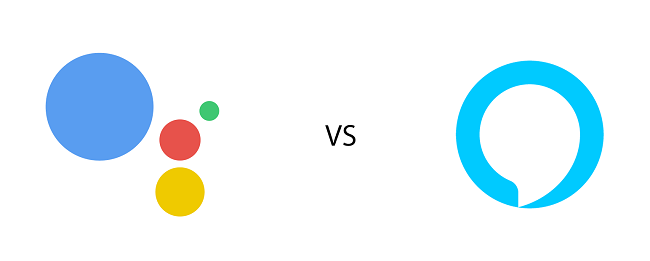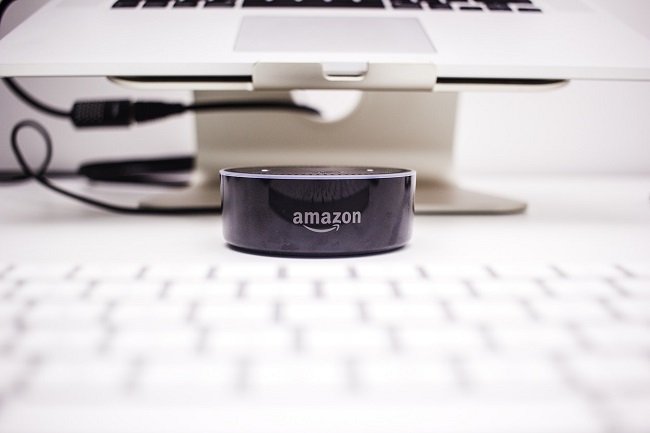Whether you first encountered it through HAL in 2001: A Space Odyssey, VIKI in I, Robot, or J.A.R.V.I.S. in Iron Man, voice technology has been a central pillar in the world of science fiction for decades.
As an avid Sci-Fi fan, myself, I can safely say it’s gotten to the point where we’re pretty much introduced to some sort of computer or artificially intelligent being who can converse intelligently with people with every other franchise that pops up. Well, science fiction it may be, but recent advancements in the world of AI and voice technology have placed us at the cusp of an exchange between “fiction” and “fact.”
Let’s take a moment to think about Hanson Robotics’ creation, Sophia. This AI robot can understand basic commands and communicate with humans. But how is “she” able to do so?
Well, to serve as a quick technological overview on how Sophia – and any other smart speaker for that matter – can work, we’ll refer to ‘a marketer’s guide to voice technology’. This guide states that the technology behind these advancements can be boiled down to two components:
- Speech recognition that converts spoken words into digital words and is measured by its accuracy and speed
- Voice recognition that identifies speakers by different features of speech like intonation, pitch and style
Moving forward, we’re going to focus on speech recognition and one of the most important things that came from it: smart speakers.
Read More About: Voice Search Optimization Tips for Your Content Marketing Plan
But what are smart speakers and why do they matter?
A quick step back before we get ahead of ourselves. You may have heard about smart speakers, but do you know what they actually do?
Powered by virtual voice-controlled by an assistant, smart speakers are the central control centers for many smart home functions and are used for entertainment, answering questions, and searching for things on the web. The prevalence of these smart home speakers around the world continues to grow in line with the growing popularity of smart home technologies.
In 2021, the number of global smart speaker shipments reached approximately 186 million, – and it’s likely to exceed 200 million per year in the next year.
Smart Speaker Usage and Key Functionalities
Smart speakers come in many shapes and sizes, but the most popular ones by far are the Amazon Echo series featuring Alexa, Apple’s HomePod Mini working alongside Siri and the Google Home line sporting Google Assistant. Before we get to the nitty-gritty of these speakers and all they can do, let’s start with some smart speaker statistics to get an overarching picture of the industry and those in it:
- It’s estimated that by the end of this year 95 million people in the U.S. will use smart speakers
- The smart speaker industry was valued at $6.4 billion in 2020 and is expected to reach $61.87 billion by 2028
- This increased usage and adoption spans ages and generations. In fact, more so than any other technology device, smart speakers have been embraced by Americans in all generations. This means that a smart speaker target market includes people aged from 25 to 55 years old.
- More than 50% of all smart speaker owners use the device daily
- Maybe this is because of the many things smart speakers and the digital assistants that come with them can do. (We’ll get to these in a bit.) After all, 71% of internet users prefer to search using voice commands instead of typing it out.
Now that we have some facts and figures to contend with, let’s take a detour and talk about some of the cool things smart speakers can do. For starters, because these speakers are paired with digital assistants we’ve grown accustomed to since their introduction in the smartphone market (e.g. Siri and the iPhone), we can do with them most of what we can with phones, i.e. use them as literal voice assistants who can search the web for us and perform certain tasks.
Starting with search, we can ask Alexa and Google Assistant just about anything and get a pretty relevant response from it. Are you curious about the distance between Mars and Jupiter? Ask away. Have you ever wanted to know what the top song in any given country is? No problem, the answer is a question away. What about dad jokes—are you a fan of them? Whether you are or you’re not, you can definitely ask to hear a couple and your smart speaker will be more than glad to oblige.
Like search, you can also ask your smart speakers a multitude of other things like:
- What’s the weather today?
- What am I doing tomorrow?
- What’s on my shopping list?
- What is the IMDb rating for [show/movie]?
- How long is left on the timer?
- How do you make [recipe]?
- How do you spell [word]?
Since asking your smart speaker to search for something is technically a command, let’s talk about some of the many commands your speakers can to respond to:
- Play [artist name]
- Play the latest [artist name] [album/song]
- Play [radio station]
- Set bass to two on sound bar
- Set the timer for [xx] minutes
- Open Netflix/Hulu/HBO, etc.
- Set an alarm for [time]
As part of these commands, you also have the option of connecting other smart appliances around your home to your speakers so you can create an intelligent hub that can all be controlled by the sound of your voice. For example, you can ask Alexa to turn the lights down, Google Assistant to turn the heat up a bit so you can relax without a sweater, and so on and so on. And then there are applications that act like branded questions and commands you can program your speakers to answer to. As to the how, it’s through smart speaker skills and actions. More specifically, Echo devices use Alexa skills, and their Google Home competitors rely on Google Assistant actions. Through these, you can—actually, let’s save that for the next section.
Read More About: How to Use Alexa Skills in Interactive Content Marketing
Tips On How To Leverage Smart Speakers For Marketing
Advertising on Smart Speakers
Smart speaker brands are known for using Siri, Alexa, and Google. These voice assistants and the compact devices that install their digital components are almost universal, and their ability to quickly provide help and assistance has become a necessity for many consumers. In case you were wondering if Alexa is used for marketing purposes, this clears that up.
So how do you start using content marketing on smart speakers? How can you optimize your content not only for plain text search but also for the new world of voice search?
Determine if it’s important to your demographic
Before you get excited about using voice-activated content, take the time to find out if your consumers are actually using Echo, Google Home, or HomePod. An interview or survey will let you know how your demographic group uses voice-activated technology and how often it uses it.
Use Alexa Flash Briefings
Have you heard of Flash Briefings? This is a new skill in Alexa’s Settings. Users can set up Alexa to provide them with a quick update, such as a blog feed update, a daily joke, an interview, or something in the news. Just as a user is used to saying, “Alexa, tell me the news every morning,” the day automatically begins, “Alex, give me my Flash Briefing.” Hopefully, this will soon include a dose of daily content from your business.
Create exclusive print-related content as pieces online
Do you publish an e-mail newsletter, printed material for direct mail, or a regular blog post? Create unique content for customers only using Amazon Echo, Google Home, or HomePod. Users like to use special queries to access exclusive information, secret discount codes, or the latest news.
Optimize content for smart speaker search
Because this concept is still relatively new, it’s hard to set specific rules for optimizing your content so that Alexa, Google, or Siri can find it. However, research has shown that FAQ-style content, articles, local information, and long-term keywords have the highest value when it comes to choosing to use smart speakers.
Use the Apple HomePod to reach music lovers
Apple launched HomePod in 2018 to keep up with the ever-expanding global smart speaker market. The device is full of sound performance, designed to create a unique listening experience despite its small size; and the unit provides beautiful, clear sound even at high volume.
Why not create some audio ads for Spotify, Pandora, or other music streaming services? According to a recent report, 68% of smart speaker owners use their devices to listen to music.
Advertise a podcast or create your own
There is still room for podcasts in the digital world. In fact, some believe that podcasts are better than blogs when it comes to building meaningful customer engagement and building brand loyalty. An IAB study found that “65% of podcast listeners are more likely to buy a product they know from a podcast. The study also found that if all things are the same, 60% of consumers would prefer to buy a brand that is their favorite podcast ad.” Creating a rich, content-rich, and interesting podcast can have good results for your customers.
How Are Brands Using Smart Speakers for Marketing?
And now we arrive at the most pressing part of this post: A discussion on smart speaker marketing that answers our titular question of how are brands using smart speakers?
Up until recently, most smart speakers were not offering paid advertisements. As a matter of fact, in 2019 Amazon mentioned that it had no immediate plans on venturing into that sector with Alexa. Google Home was in the same boat. Of course, our previous section indicates that this has since changed, and advertising is indeed possible.
Let’s consider Google Home’s “My Day” feature as well as Amazon Echo’s “Flash Briefing” feature, which narrates the news and other day-to-day information a user wants to hear as part of their routine. Well, by purchasing ad space on any of these channels, you make it more likely that your content will land in front of your target audience.
In addition to the ads route, brands also have the two more traditional marketing options with smart speakers:
- Delve into technical to get themselves ranking on voice search results so smart speakers can pull up their answers first
- Create Alexa skills and Google Assistant actions that entertain people or provide a service, both of which improve brand recognition and loyalty
1. Getting Technical with Smart Speaker Marketing
With the goal of improving their odds of being pulled up for an Alexa or Google Assistant query, the most popular smart speaker marketing strategy brands employ is to optimize their digital properties for voice search. You can get a full voice search optimization guide here, but for today we’ll compress it into six tips:
- Secure your site with HTTPS – HTTPS is the standard for all communication on the web, and Google makes it known that they prefer websites that have made the move and added the extra ‘S’ after HTTP. In fact, 70.4% of voice search result URLs belong to websites that have already adopted HTTPS.
- Use structured Data – Structured data, also called schema markup, is metadata that tells web crawlers what the content on a page means. By structuring your data, you make it easy for search engines to go through your content and actually understand its meaning, which provides a richer set of data points that give you more opportunities to be found.
- Improve your mobile site speed – With a mobile-first mentality, not only does Google punish slow websites with lower search rankings, but real data also tells us that the average voice result page loads in 4.6 seconds (52% faster than the average page).
- Create a FAQ page – Because their content is in the perfect format for voice search—a conversational question followed by a short and concise answer—FAQ pages are practically fodder for smart speakers.
- Publish blog posts that answer your user’s questions – Similar to FAQ pages, posts that answer the questions your users are asking are more likely to be pulled up for a voice query.
- Use conversational content – People tend to talk with Alexa and Google Assistants as if they, too, are human, which means conversational content that reveals intent.
2. Getting Creative with Skills and Actions
A more relevant tactic for smart speaker marketing is creating applications in the form of skills and actions that smart speaker users can use day in and day out. Many brands used to be more tentative to pursue this course of action in the past because they didn’t think the payoff was worth the investment, but things are different today.
Today, more and more users are turning to their smart speakers for help, for news, for entertainment, and for pretty much anything you can think of. For example, consider HBO. Apart from creating general HBO skills/actions that keep you updated with what’s new on their end, they’ve also introduced Westworld: The Maze, as a choose-your-own-adventure-style game for Echo-using “Westworld” fans. The beauty of this and similar applications is that every use leads to a bump in brand loyalty, recognition and awareness. Even better, if you put out a skill or action like Domino’s Pizza’s AnyWare skill and action that allows people to order pizza with their voice, you can also benefit monetarily.
Read More About: Important Voice Technology Components and How You Can Use Them
Actually, now that we’re on the subject of HBO, it’s best to mention what they themselves have already done to jump in the smart speaker game. Apart from general HBO skills/actions that keep you updated with what’s new on their end, they’ve also introduced Westworld: The Maze, as a choose-your-own-adventure-style game for Echo-using “Westworld” fans.
The beauty of this and similar applications is that every use leads to a bump in brand loyalty, recognition and awareness. Even better, if you put out a skill or action like Domino’s Pizza’s AnyWare skill and action that allows people to order pizza with their voice, you can also benefit monetarily.

As you can see with these two examples, smart speaker applications give you an opportunity to interact with your audience on a brand new channel, and you really should try your hand at them if you feel that your users can actually benefit from it. If you’re still on the fence, maybe the following list of branded skills and actions will change your mind:
- Have you ever spilled coffee on your shirt? Have you ever tripped and ended up with a grass stain on your white pants? Have no fear, Tide’s Stain Remover skill is here to offer step-by-step instructions for every type of stain!
- Do you suffer from allergies? Well, just like a weather app gives you information about the climate, allergy medicine Zyrtec’s Your Daily AllergyCast skill provides information like a pollen count forecast local to your area. With user feedback, the skill can even provide a personalized Allergy Impact score to let you know how environmental factors will affect you.
- If you’re a fan of cooking but are running low on recipe’s, Campbell’s Kitchen skill is exactly what you’ve been looking for. Why? Because it can tell you recipes and suggestions based on your taste profile, the weather, and even what’s trending.
- With over 2,000 delicious recipes waiting for you, BuzzFeed’s Tasty action gives you all the help you need to start cooking food you’ll actually enjoy eating.
- Am I the only one who spontaneously gets the urge to buy flowers? Considering that 1-800-Flowers’ action allows you to send gifts to the most important people in your life (including yourself), I doubt I’m alone.
- Does the act of telling your Google Assistant to find tickets for the latest live events appeal to you? If it does, you better make use of the Ticketmaster action, which will be your go-to-to discover tool to all the latest and greatest entertainment.
Note: Just because an application is labeled as a “skill” or “action” does not mean that it it only that; like smartphones (iOS vs Android), brands tend to make an application for each operating system so a larger percentage of their user base can enjoy them.
Final Thoughts
In today’s day and age, smart speakers are the epitome of the modern smart home. With voice command functionality and third-party integration, not only can smart speaker users benefit from the multitude of applications they can download, but the brands behind them as well.
If you’ve been thinking of changing things up this year, but haven’t really decided on what to do, I’ll give you a suggestion: Venture into the joint smart speaker and voice technology market before your competition beats you to it.
Contact Aumcore to learn more about what Smart Speakers can do for your brand.





Tell us your thoughts in the comments